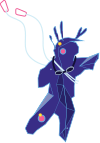User talk:Kproff
Kproff, you are invited on a Wikipedia Adventure!
[edit]
|
Hi Kproff!! You're invited to play The Wikipedia Adventure, an interactive game to become a great contributor to Wikipedia. It's a fun interstellar journey--learn how to edit Wikipedia in about an hour. We hope to see you there! This message was delivered automatically by your robot friend, HostBot (talk) 18:10, 4 December 2013 (UTC)
|
December 2013
[edit]![]() Hello, I'm BracketBot. I have automatically detected that your edit to Argument from reason may have broken the syntax by modifying 1 "()"s. If you have, don't worry: just edit the page again to fix it. If I misunderstood what happened, or if you have any questions, you can leave a message on my operator's talk page.
Hello, I'm BracketBot. I have automatically detected that your edit to Argument from reason may have broken the syntax by modifying 1 "()"s. If you have, don't worry: just edit the page again to fix it. If I misunderstood what happened, or if you have any questions, you can leave a message on my operator's talk page.
- List of unpaired brackets remaining on the page:
- 58-59), Richard Taylor’s ''Metaphysics'' (Englewood Cliffs, NJ: Prentice Hall, 1974), pp. 114-15), and J. P. Moreland's ''Scaling the Secular City: A Defense of Christianity'' (Grand Rapids, MI:
Thanks, BracketBot (talk) 14:48, 5 December 2013 (UTC)
Realism
[edit]Kproff, you are doing good work. Make a user page for yourself so that we can communicate properly with you. PraeceptorIP (talk) 01:51, 1 April 2016 (UTC)
I used your material from Jerome Frank to start a separate article on Law and the Modern Mind. Cheers! bd2412 T 13:00, 29 March 2017 (UTC)
Wikipedia and copyright
[edit]![]() Hello Kproff, and welcome to Wikipedia. All or some of your addition(s) to The Problem of Pain have been removed, as it appears to have added copyrighted material without evidence of permission from the copyright holder. While we appreciate your contributing to Wikipedia, there are certain things you must keep in mind about using information from your sources to avoid copyright or plagiarism issues here.
Hello Kproff, and welcome to Wikipedia. All or some of your addition(s) to The Problem of Pain have been removed, as it appears to have added copyrighted material without evidence of permission from the copyright holder. While we appreciate your contributing to Wikipedia, there are certain things you must keep in mind about using information from your sources to avoid copyright or plagiarism issues here.
- You can only copy/translate a small amount of a source, and you must mark what you take as a direct quotation with double quotation marks (") and cite the source using an inline citation. You can read about this at Wikipedia:Non-free content in the sections on "text". See also Help:Referencing for beginners, for how to cite sources here.
- Aside from limited quotation, you must put all information in your own words and structure, in proper paraphrase. Following the source's words too closely can create copyright problems, so it is not permitted here; see Wikipedia:Close paraphrasing. (There is a college-level introduction to paraphrase, with examples, hosted by the Online Writing Lab of Purdue.) Even when using your own words, you are still, however, asked to cite your sources to verify information and to demonstrate that the content is not original research.
- Our primary policy on using copyrighted content is Wikipedia:Copyrights. You may also want to review Wikipedia:Copy-paste.
- If you own the copyright to the source you want to copy or are a designated agent, you may be able to license that text so that we can publish it here. However, there are steps that must be taken to verify that license before you do. See Wikipedia:Donating copyrighted materials.
- In very rare cases (that is, for sources that are public domain or compatibly licensed), it may be possible to include greater portions of a source text. However, please seek help at the help desk before adding such content to the article. 99.9% of sources may not be added in this way, so it is necessary to seek confirmation first. If you do confirm that a source is public domain or compatibly licensed, you will still need to provide full attribution; see Wikipedia:Plagiarism for the steps you need to follow.
- Also note that Wikipedia articles may not be copied or translated without attribution. If you want to copy or translate from another Wikipedia project or article, you can, but please follow the steps in Wikipedia:Copying within Wikipedia.
It's very important that contributors understand and follow these practices, as policy requires that people who persistently do not must be blocked from editing. If you have any questions about this, you are welcome to leave me a message on my talk page. Thank you. — Diannaa 🍁 (talk) 09:12, 9 April 2017 (UTC)
Disambiguation link notification for February 9
[edit]Hi. Thank you for your recent edits. An automated process has detected that when you recently edited Virtue jurisprudence, you added a link pointing to the disambiguation page Robert George (check to confirm | fix with Dab solver). Such links are usually incorrect, since a disambiguation page is merely a list of unrelated topics with similar titles. (Read the FAQ • Join us at the DPL WikiProject.)
It's OK to remove this message. Also, to stop receiving these messages, follow these opt-out instructions. Thanks, DPL bot (talk) 13:31, 9 February 2020 (UTC)
